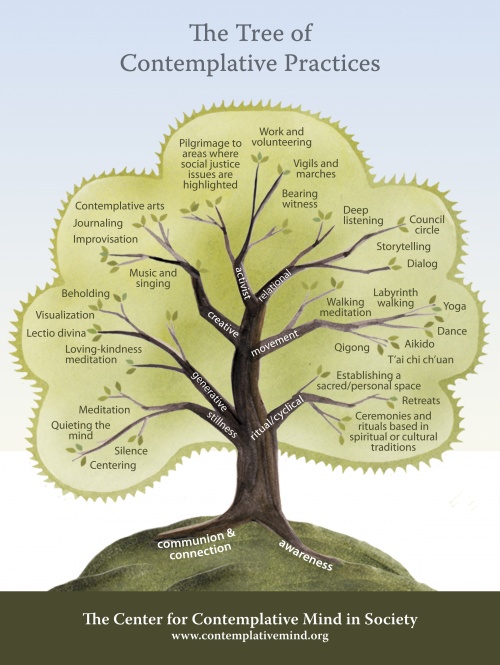Xavier Contemplative Inquiry Team: Difference between revisions
m formatting |
revising |
||
| (2 intermediate revisions by 2 users not shown) | |||
| Line 1: | Line 1: | ||
The Xavier Contemplative Inquiry Team (XCIT) | The Xavier Contemplative Inquiry Team (XCIT) was a community of inquiry which was active on Xavier's campus from 2015 to 2018. The team convened regular meetings in three distinct cohorts, with each cohort active over the course of a single academic year. | ||
The team was participant-driven, meaning that the specific agenda and activities of the group were determined by the team members, with guidance from CAT+FD staff. Broadly speaking, the team supported three main areas of inquiry: | |||
# understanding contemplative practices broadly with a particular focus on establishing, maintaining, and deepening of personal practice; | # understanding contemplative practices broadly with a particular focus on establishing, maintaining, and deepening of personal practice; | ||
| Line 5: | Line 7: | ||
# researching, writing, and publishing on topics related to contemplative practice. | # researching, writing, and publishing on topics related to contemplative practice. | ||
Each participant | Each participant developed their own goal(s) under one or more of these areas. | ||
Participants | Participants enjoyed support in the form of readings, meals, access to consultants, and fellowship. In addition, limited funds supported faculty travel to events such as the Summer Session on Contemplative Pedagogy. Further, participants offered workshops, open to all Xavier faculty, in an effort to continue raising awareness and interest in contemplative pedagogy. | ||
'''For the 2017-2018 academic year, we | '''For the 2017-2018 academic year, we focused on STEM disciplines''' and looked at some of the exciting research in this area. For each meeting, we examined a recent article from a peer-reviewed scientific journal. We also looked at some of the gizmos, gadgets, and apps that purport to promote mindfulness, per the interest of the group. | ||
Though primarily promoted to faculty, participation in the Xavier Contemplative Inquiry Team | Though primarily promoted to faculty, participation in the Xavier Contemplative Inquiry Team was open to any faculty, staff, or students at Xavier University of Louisiana who were willing to make the necessary commitment regardless of previous experience or lack thereof. | ||
==What is contemplation?== | ==What is contemplation?== | ||
| Line 19: | Line 21: | ||
We recognize the diversity of contemplative practices, as illustrated via the [http://www.contemplativemind.org/practices/tree tree metaphor] by the Center for Contemplative Mind in Society. | We recognize the diversity of contemplative practices, as illustrated via the [http://www.contemplativemind.org/practices/tree tree metaphor] by the Center for Contemplative Mind in Society. | ||
[[Image: | [[Image:Tree of Contemplative Practices.jpg|center|500px]] | ||
==Community of inquiry== | ==Community of inquiry== | ||
Latest revision as of 09:46, 29 May 2019
The Xavier Contemplative Inquiry Team (XCIT) was a community of inquiry which was active on Xavier's campus from 2015 to 2018. The team convened regular meetings in three distinct cohorts, with each cohort active over the course of a single academic year.
The team was participant-driven, meaning that the specific agenda and activities of the group were determined by the team members, with guidance from CAT+FD staff. Broadly speaking, the team supported three main areas of inquiry:
- understanding contemplative practices broadly with a particular focus on establishing, maintaining, and deepening of personal practice;
- planning, implementing and assessing contemplative pedagogies, and
- researching, writing, and publishing on topics related to contemplative practice.
Each participant developed their own goal(s) under one or more of these areas.
Participants enjoyed support in the form of readings, meals, access to consultants, and fellowship. In addition, limited funds supported faculty travel to events such as the Summer Session on Contemplative Pedagogy. Further, participants offered workshops, open to all Xavier faculty, in an effort to continue raising awareness and interest in contemplative pedagogy.
For the 2017-2018 academic year, we focused on STEM disciplines and looked at some of the exciting research in this area. For each meeting, we examined a recent article from a peer-reviewed scientific journal. We also looked at some of the gizmos, gadgets, and apps that purport to promote mindfulness, per the interest of the group.
Though primarily promoted to faculty, participation in the Xavier Contemplative Inquiry Team was open to any faculty, staff, or students at Xavier University of Louisiana who were willing to make the necessary commitment regardless of previous experience or lack thereof.
What is contemplation?
Contemplation includes the focusing of the attention in a sustained fashion leading to deepened states of concentration, tranquility, insight and contextualizing orientations. These are the basis of a clear and spontaneous cognition that is able to attend effortlessly to whatever presents itself, and of compassion, love, loving-kindness, and various other-regarding ethical orientations. It occurs on a spectrum: from the rather common spontaneous experiences of absorption in an activity to the most profound experiences deliberately cultivated in religious traditions. (Adapted from Harold Roth, Brown University)
We recognize the diversity of contemplative practices, as illustrated via the tree metaphor by the Center for Contemplative Mind in Society.

Community of inquiry
"An educational community of inquiry is a group of individuals who collaboratively engage in purposeful critical discourse and reflection to construct personal meaning and confirm mutual understanding."
Garrison, D. R., & Anderson, T. (2003). E-learning in the 21st century a framework for research and practice. London; New York: RoutledgeFalmer.
See the CoI Model from Athabasca University.
Meeting schedule and participant information
Newsletter
Archived: XCITRON
Historical background
Since 2010, the Center for the Advancement of Teaching and Faculty Development has actively promoted contemplative pedagogy through presentations, workshops, travel grants, meditation sessions, and other diverse means. The formation of a Contemplative Inquiry Team, supported by a generous grant from the Mellon Foundation, is the latest iteration of these ongoing efforts.
This initiative is part of The Transformative Banquet.